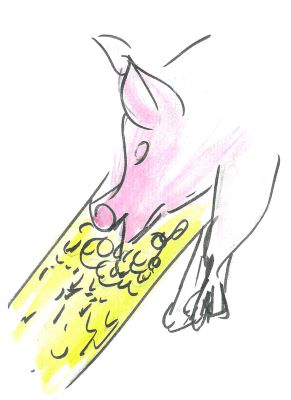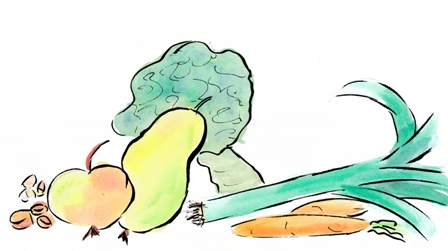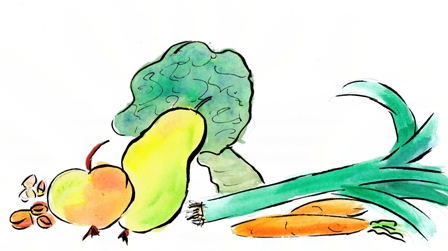
Module 5 - Food and waste
All illustrations except the background image: © fbw4/Julia Beckel, available under the Creative Commons Licence BY-NC-SA.
Introduction - How your food choices help the earth
What does nutrition have to do with climate change?
Our diet is responsible for one third of global greenhouse gas emissions. The global food system accounts for more than one third of global greenhouse gas emissions.
So if we want to do something for climate protection, we also have to rethink our diet.
You will find tips for how your food choices can make a big difference:
- The benefits of eating more plants
- Why eating less meat is a big win
- Why buying seasonal food is a great idea
- Why buying local food makes sense
- Stop wasting food
1. Eat more plants to help save the climate!
In this module, we're going to talk about something really important: how eating more plants can make a big difference in protecting our planet from something called climate change.
Plants are amazing! They're not just good for us; they're good for our Earth too. When we eat more plants, we're actually helping to protect our planet from getting too warm, and that's a big deal.
Plants: our green heroes:
Plants are like superheroes for our health and our Earth. When we choose to eat more plant-based foods, we're not only taking care of ourselves but also helping to protect the environment. Let's explore the some of the incredible benefits:
Plants are packed with nutrients that our bodies love. When we eat them, they help keep our hearts healthy and our bodies strong. Here's how:
- Strong hearts: Eating more plants can lower the risk of heart problems like heart attacks and high blood pressure. They have special powers to keep our hearts ticking strong.
- Energy boost: Plants give us lots of energy to run, play, and do all the things we love. They're like fuel for our bodies.
- Tummy Smiles: The fibre in plants is like a gentle hug for our tummies. It helps us digest food better and keeps our tummies feeling happy.
- Healthy growth: If you're growing, plants are your best friends. They help you grow strong and tall.
- Sharp minds: Eating well can make our minds sharp and focused. It's like giving our brains superpowers!
Simple Ways to Eat More Plants:
Now that you know all the amazing benefits, you might be wondering how to eat more plants. Don't worry; it's easy and delicious. Here are some simple ideas:
- Start small: Try having one meatless meal a week. It's a small step with a big impact.
- Colourful plates: Fill your plate with lots of colourful fruits and vegetables. They're not only good for you but also look super inviting.
- Tasty snacks: Choose snacks like crunchy carrots, sweet apples, or a handful of nuts. They're yummy and healthy.
- Explore new foods: Don't be shy to try new foods like avocados, sweet potatoes, or beans. You might find some new favourites.
- Veggie friends: Share meals with friends and family. It's more fun when everyone enjoys tasty plant-based dishes together.
2. Why eating less meat is a big win
Now, we're going to talk about something really important: why it's a fantastic idea to eat less meat.
What's the big deal about meat?
You might be wondering, "Why are we talking about eating less meat?" Well, meat is tasty, and it gives us energy, but there's more to the story. Let's explore why eating less meat is a smart choice.
The problem with too much meat: 
Making meat like beef, pork, and chicken takes a lot of work and uses tons of resources. It needs a bunch of land for the animals to live on, lots of water to drink, and even more food to eat. All of this makes it harder for our Earth to stay cool.
Greenhouse Gases and Meat:
When animals are raised for meat, they make something called "greenhouse gases." These gases are like invisible blankets that wrap around the Earth. They trap heat from the sun and make our planet warmer. When the Earth gets too warm, it can cause all sorts of problems, like big storms, melting ice, and even harm to animals and plants.
Now, let's talk about why eating less meat is a great idea for you and our Earth:
- Good for your health: Eating less meat can be good for your health. It can lower the risk of heart problems and help you maintain a healthy weight.
- Saves resources: When we eat less meat, we use fewer resources like land and water. That's good for the environment.
- Less pollution: Making meat can create a lot of pollution. By choosing plant-based foods, we help reduce pollution in the air and water.
3. Why buying seasonal food is a great idea
First, let's talk about what "seasonal" means when it comes to food. Seasonal food is the stuff that's grown and harvested during a certain time of the year when it's naturally ripe and ready to eat. It's like nature's way of giving us the freshest and tastiest treats.
There's something magical about eating fruits and vegetables when they're in season. Here's why it's such a great idea:
- Fresher and tastier: Seasonal food is usually picked at its ripest and yummiest. That means it's bursting with flavour and packed with all the good stuff your body needs.
- Support local farmers: When you buy seasonal food, you often support local farmers. That means your food doesn't have to travel far to reach your plate, which is good for the environment.
- Save money: Seasonal food is often cheaper because there's more of it available. So, you can enjoy delicious meals without breaking the bank.
- Reduce pollution: When we buy food that's grown far away and needs to be transported long distances, it can create pollution. Choosing seasonal food helps reduce pollution from trucks and planes.
- Variety in your diet: Eating what's in season means you get to enjoy different foods at different times of the year. It keeps your meals exciting and your taste buds happy.
- Seasonal food saves the earth: Growing food out of season can use a lot of energy because it needs special conditions like extra heat or light. That energy often comes from fossil fuels, which can harm the planet.
How to enjoy seasonal food:
- Get to know your seasons: Learn when your favourite fruits and veggies are in season in your area. You can ask local farmers or check online for guides.
- Visit farmers' markets: Farmers' markets are great places to find seasonal food. Plus, you can meet the people who grow your food!
- Freeze and preserve: When a food is in season, you can freeze or preserve it for later. This way, you can enjoy your favourite fruits and veggies all year round.
4. Why buying local food makes sense
What does "local" mean when it comes to food? Local food is the stuff that's grown or made close to where you live. It's like a tasty treasure from your own neighbourhood or nearby areas.
There's something special about choosing local food:
- Freshness at its best: Local food is often super fresh because it doesn't have to travel far. That means it's packed with flavour and all the good stuff your body loves.
- Support your neighbours: When you buy local food, you're often supporting your neighbours, the farmers and makers who work hard to bring you delicious treats.
- Reduce pollution: Food that doesn't have to travel long distances doesn't create as much pollution. It's like giving the Earth a little break from all those trucks and planes.
5. The big problem: food waste
Did you know that a lot of food goes to waste every day? It's true, and it's a big problem. When we waste food, it's not just bad for our wallets, it's also bad for the Earth.
It takes a lot of work to grow, harvest, and transport that food to your plate. Farmers use their energy, water, and time to grow fruits, vegetables, and grains. Trucks and planes use fuel to bring food to the store.
So, when we throw away food, we're wasting all that energy and effort too.
Food in the Trash Makes Gas: 
Here's another thing to know: when food rots in the trash, it makes something called "methane gas." This gas is a bit like a super-powered greenhouse gas, and it's not good for our planet. It makes the Earth warmer and can cause problems like strange weather and rising sea levels.
How to Stop Food Waste:
Don't worry; it's easier than you might think. Here are some simple tips:
- Plan your meals: Before you go shopping, make a list of the foods you need. This way, you won't buy too much.
- Use what you have: Check your fridge and cupboards before going shopping. Sometimes we forget what we already have, and it goes bad.
- Buy smart: Buy fruits and veggies that don't spoil quickly, and try not to buy too much at once.
- Eat leftovers: If you have food left after a meal, save it and eat it the next day. It's like getting a bonus meal!
- Keep it fresh: Store food properly. Keep fruits and veggies in the fridge, and use up the things that might go bad soon.
- Share with others: Sometimes we cook too much. Sharing a meal with friends or family is a great way to enjoy your food and prevent waste.
Conclusion
So, you see, the food we eat can really make a difference for our planet. Eating more plants, wasting less, and making smart choices about what we eat can help stop climate change and protect our Earth. It's something we all can do, and it's good for us and our planet.
Thank you for reading!!
